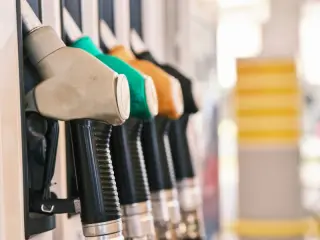
For fleet managers, choosing the right fuel for their vehicles is a pivotal decision that impacts both performance and cost efficiency. With options ranging from supermarket fuel to branded varieties, the choice can be daunting.
Most people and businesses often look for the cheapest option when purchasing fuel. Typically, fuel with the lowest costs can be found in supermarket forecourts, where competing brands drive down prices to attract shoppers who fill up as part of their weekly shop.
Although supermarket fuels are the cheapest, some drivers have concerns about the quality of the fuel. However, is this theory backed up by science?
We’ve investigated, fact-checked the rumours, and explored whether there’s any difference between the two. And if so, which type is best for your fleet?
Quality assurance considerations
It’s worth noting that all petrol and diesel sold in the UK must conform to British and European standards. This is "E10" for unleaded petrol and EN 15940 for diesel fuel. Therefore, they all work in the same way and if you combine fuels from different sources, they would all work without an issue.
The fuel you find in supermarkets has the same regulations as premium sellers. And they’re held to the same quality and safety standards. So, although it’s cheaper, you can be reassured that you aren’t purchasing a harmful or unsafe product.
However, there are differences between the fuels you can buy today when you take into account the additives that are sometimes added.
Supermarket fuel
Supermarkets in the UK offer competitively priced fuel options. However, these fuels might not contain the same level of additives or detergents as branded counterparts. They usually meet regulatory standards but might lack specialised components that enhance engine cleanliness and performance.
Branded fuel
Branded fuels in the UK generally come with a premium. Yet, they often contain proprietary additives designed to improve engine performance, maintain cleanliness, and boost fuel efficiency. These additives can minimise carbon deposits, leading to smoother operations and potentially reducing long-term maintenance costs.
Supermarket fuel also contains these additives, but likely in lesser quantities than their branded counterparts. Additionally, the alternative fuel option, commonly known as "super-unleaded fuel," is better quality than standard unleaded. However, this difference with superior-quality fuel is primarily felt with high-performance vehicles, like sports cars.
Performance and mileage considerations
Supermarket fuel performance
While meeting basic standards, supermarket fuels might not have the same specialised additives found in branded fuels. This disparity could impact engine performance and fuel efficiency, potentially resulting in reduced mileage over time.
Branded fuel performance
Branded fuels are engineered with advanced additives tailored to enhance engine performance. They burn cleaner, reducing carbon buildup and potentially extending the life of engine components. This can translate into better mileage and decreased maintenance needs for your fleet.
Cost considerations
Supermarket fuel cost
There's a widespread belief that supermarkets like Tesco, Asda, Sainsnury's, and Morrisons offer fuel at a more affordable rate than branded alternatives. According to Which?, this is true. These supermarkets engage in intense competition when setting their petrol prices, ultimately leading to reduced costs at the pumps.
Branded fuel cost
Unsurprisingly, due to the additions of detergents and other chemicals, the price of premium fuel is more than that of regular fuel. Fuel prices vary nationwide based on location. For example, rural regions might offer more affordable fuel compared to bustling cities.
The critical advice is steering clear of motorway fill-ups due to their excessively high prices. Petrol stations capitalise on the fact that when you're on the motorway and running low on fuel, you're compelled to pay regardless of the cost.
Ultimately, if your fleet relies on vehicles with modern small to medium-sized engines, the benefits of premium fuel may be limited.
However, some additives can improve the efficiency and lifespan of older vehicles and the benefits of modern vehicles (in terms of reliability, MPG, and cost of upkeep) mean that older cars can be impractical for a fleet owner.
Are premium fuels better for your vehicle?
Premium fuels, also referred to as “super” or “high performance” fuel, have a higher octane rating than other fuels offered at the pumps. This means that the fuel is harder to ignite, requiring greater compression than lower octane fuels. Alternatively, if you have a diesel engine, the premium equivalent will come with a higher cetane rating.
Typically, high-performance engines will compress their fuel more, so by using a higher octane fuel, you’re able to avoid internal explosions that may damage your engine.
Branded fuels often label their products with different names; however, when deciding what’s best for you, it can be helpful to focus instead on the octane content of the fuel for an accurate measure of the quality.
Some vehicles do benefit from higher octane fuels and are recommended as standard, but the simplest way to find out what octane best suits your car’s engine is to check your car’s handbook. You may also be able to find this information on the casing around your fuel cap.
The benefits of high-octane fuels tend to focus on high-powered engines such as high-end sports cars, which you’re unlikely to find in your average fleet. So, if your fleet is made up of practical vehicles, do premium fuels still benefit you?
If your vehicle doesn’t require a higher octane fuel, but you still fill it up with premium fuel, you may not see any immediate changes in performance as the impact does vary depending on the make and model of your ca,r but over the longer term, you may find improvements in terms of reduced wear and tear on the engine.
The bottom line is that there's no downside to going for supermarket fuel, as it's usually cheaper and won’t damage your vehicle. Remember that all fuel in the UK adheres to British Standards, ensuring your vehicle remains unaffected. Given the rising cost of living, opting for affordable fuel can be a sensible option.
For UK fleets focused on performance and long-term cost savings, investing in branded fuels could prove advantageous. The specialised additives in branded fuels contribute to cleaner engines, better mileage, and potentially reduced maintenance requirements, offsetting the higher initial cost.
No matter which fuel you choose to use, at Right Fuel Card, we offer a wide range of fuel cards to help improve your fleet management. Working with major fuel providers in the UK, we can provide you with the best products on the market so that you can find fuel cards to suit your specific needs. We can offer you fuel cards for the following forecourts and providers:
And of course, we can provide you with fuel cards for supermarket forecourts too.
If you are looking for more control over your fuel costs, then use our card finder tool to find the best card for your business today.




